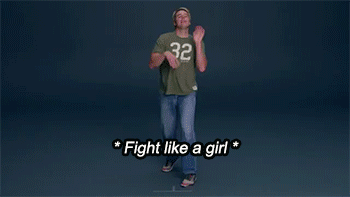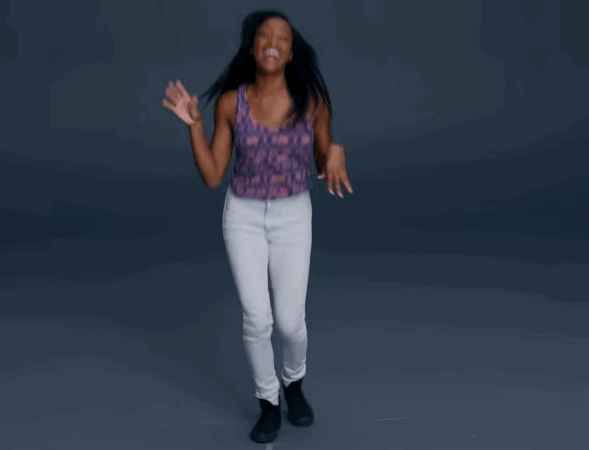

"Like a girl"
Early on in the video, the narrator asks, “When did doing something ‘Like a Girl’ become an insult?”. This is more of a rhetorical question that’s meant to almost hold the audience accountable and open up their eyes. The placement of this is interesting because it’s right after the comparison of the two different ways the two separate groups of the older girls and the two guys view the term as opposed to the younger girls which seems to answer the question originally asked.
The phrase “like a girl” has been used as a way of degrading or insulting someone for quite a while now, but it seems as though it is more of an issue in today’s society where women are continued to be viewed as the weaker sex. Therefore, it is important and relevant to analyze this Always ad because of how it challenges the culture norm that portrays the term ‘like a girl’ in a negative connotation. Changing the way in which we view this term is the first step towards building young women’s self-esteem in a world that is constantly putting them down and giving them the opportunity to see themselves as equals and not weaker. This ad is trying to get its main point across by using things such as a female narrator, which is meant to represent a community of women supporting each other by having her direct the participants in the right direction throughout the ad and by including a group of younger girls who don’t view the term as anything negative which goes to show that this cultural norm is something we learn to accept as we grow older.
To Run Like a Girl, Is to Run Like You

One interesting part of the video is when the narrator asks a young boy to throw like a girl. The boy gives his worst attempt and finished it off with an “aw” to emphasize the fact that he clearly couldn’t throw. He is then asked, “So do you think you just insulted you sister?” and he responds with “No, I mean, yeah... insulted girls, but not my sister.” This is interesting because it shows that people, more specifically guys, don’t take into consideration the fact that they are not only insulting girls in general, but also the women in their lives that they care about. Even if they are aware, they don’t care but to generalize the stereotype. We see the same type of actions when an older male is asked to fight like a girl. He laughs beforehand because he can’t seem to take the demand seriously and proceeds to claw at the air with his eyes closed. He’s trying to get across the point that girls can't fight and those who try look ridiculous in the process. Having both the older man and the younger boy in this ad is done with the intention of showing the audience that this concept goes beyond just an age group. The interesting thing though is that unlike the guys in the video, the difference of age groups between the girls proved that the younger girls were yet to be affected by the phrase.
The narrator then proceeds to ask a little girl if she thought the term was a good or a bad thing. The girl sort of hesitates to answer. She second guesses herself and finally responds with, “I actually don’t know what it really... if it's a bad thing or a good thing. it sounds like a bad thing. It sounds like you’re trying to humiliate someone.” Because she was a fairly young girl, this helps get their main point across about the fact that this “insult” lowers girl’s self-esteem. The director asks the audience as a whole, “A girl’s confidence plummets during puberty. So, when they’re in that vulnerable time, between ten and twelve... how do you think it affects them when someone uses ‘Like a Girl’ as an insult?” This quote connects their brand with the topic of interest which kind of brings everything full circle and shows that things like this affect impressionable girls at this age, when their brand is selling to girls starting at that age. This Always ad does a good job getting it’s point across by having the two different groups participate. It’s easy to see that the one group composed of older girls, one man, and a little boy acted out the term “like a girl” as how it is negatively portrayed through the media. On the other hand, the younger girls actually tried when it came to be their turn. They don’t see this phrase as an insult, but rather as a challenge. These were girls who were just under the age of puberty.

The “like a girl” campaign had conducted researched that proved to show how more than half of women experienced a decline in confidence post puberty. The sad part though, is that the older girls proved to be aware of the insult towards them. They’ve grown accustomed to it. On the other hand, the younger girls actually tried when it came to be their turn. They don’t see these phrases as insults, but rather as a challenge. This Always ad is trying to show us how society crushes girl's self-esteem as they mature. We fall into the stereotypes of what we are or aren't capable of. When the girls are asked to perform the acts a second time after having discussed the topic, they all give it their best go. As we get close to the end of the video, we get shots of the older girls answering the original question, “how do you think it affects them when someone uses ‘Like a Girl’ as an insult?”. The first girl explains that girls at that age are already going through enough trying to figure themselves out, and when someone says something like “you hit like a girl” to them, it’s almost like they are telling them that they’re weak and “they’re not as good as them”.
Another girl is asked to provide the audience of young girls with advice regarding the phrase and she proceeds to explain that it’s their problem if they think that you throw like a girl, because so long as you’re succeeding, you're doing it right. Now this is important because it shows the change in perspective from the beginning of the video to the end. We see how the narrator is able to steer the older girls in the right direction. She manages to get the girls to understand that the phrase shouldn’t have power over them. And in a way, we can see the girls begin to realize that they’ve blindly accepted the term without question. The last girl was asked if she’d like the chance to redo the action if asked again, and we later get a clip of her running not just as a girl, but as herself.
The end of the video is attempting to open us up to the possibility of not viewing the term as an insult, but as just another challenge. The very end of the video has the phrase “Rewrite the Rules” which only pushes up to stop accepting these negative cultural norms and instead create new positive ones. This is a commercial advertising a brand of feminine products, so it’s worth noting that by advertising this campaign, although they might be doing so purely for the intention of getting an important message across, they will also be benefiting from it. This campaign is obviously relevant today and will cause some type of controversy which goes to get their brand’s name out.

For this page, I decided to go with a color scheme that would sort of stay true to the last page and not be too far off from the actual background so that the website doesn't come off as too chaotic and so that I could maintain a somewhat consistent theme. I chose to include this rhetorical analysis project because the topic is very similar to the last. Although, they are two different projects, they have the the topic of feminism in common. This made it easier for me to work on the aesthetic of both pages and have them be connected in some way. I decided to go with a simple pastel pink background to embrace the feminine side and the faint blue to compliment and balance out the pink. I did not want this page to be 50 shades of pink. I also decided to include some stickers of women to again, embrace the feminism (especially the girl with the poster at the very top), and the dividers are to help better separate large chunks so that the page wasn't too text heavy. This also gave the page an easier flow, like the arrows for example. Lastly, I tried to include images and gifs in places that helped balance and compliment the text boxes. They also have boarders to make them better fit into the site's overall theme.
Author's Note






when did "like a girl" become an insult?
Citations
Always. “Always #LikeAGirl.” YouTube, YouTube, 26 June 2014,
www.youtube.com/watch?v=XjJQBjWYDTs. Accessed 23 February 2019.
Berman, Jillian. “Why That 'Like A Girl' Super Bowl Ad Was So Groundbreaking.” The Huffington Post, TheHuffingtonPost.com, 3 Feb. 2015,
www.huffingtonpost.com/2015/02/02/always-super-bowl-ad_n_6598328.html. Accessed 23 February 2019.
Burnett, Leo. “Leo's Cannes Contenders: Always "#LikeAGirl.’” Leo Burnett, Leo Burnett, www.leoburnett.com/articles/work/what-it-means-to-be-likeagirl/. Accessed 23 February 2019.






